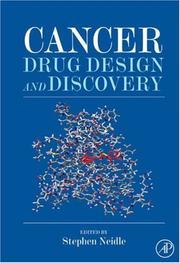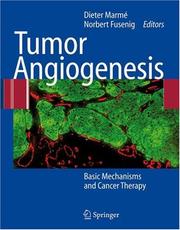| Listing 1 - 4 of 4 |
Sort by
|

ISBN: 1281763683 9786611763688 0080554954 0123694485 9780123694485 9780080554952 Year: 2008 Publisher: New York Academic Press
Abstract | Keywords | Export | Availability | Bookmark
 Loading...
Loading...Choose an application
- Reference Manager
- EndNote
- RefWorks (Direct export to RefWorks)
The ultimate source of information on the design of new anticancer agents, emphasizing small molecules, this newest work covers recent notable successes resulting from the human genome and cancer genomics projects. These advances have provided information on targets involved in specific cancers that are leading to effective medicines for at least some of the common solid tumors. Unique sections explain the basic underlying principles of cancer drug development and provide a practical introduction to modern methods of drug design.
Antineoplastic agents --- Development. --- Design. --- Anticancer agents --- Antineoplastic drugs --- Antineoplastics --- Antitumor agents --- Antitumor drugs --- Cytotoxic drugs --- Inhibitors, Neoplasm --- Neoplasm inhibitors --- Drugs --- Cancer --- Chemotherapy
Book
ISBN: 0814707777 9780814707777 9780814707258 0814707254 9780814707357 0814707351 Year: 2008 Publisher: New York, NY
Abstract | Keywords | Export | Availability | Bookmark
 Loading...
Loading...Choose an application
- Reference Manager
- EndNote
- RefWorks (Direct export to RefWorks)
2009 Choice Outstanding Academic Title2009 Association of American University Presses Award for Jacket Design Chemo brain. Fatigue. Chronic pain. Insomnia. Depression. These are just a few of the ongoing, debilitating symptoms that plague some breast-cancer survivors long after their treatments have officially ended. While there are hundreds of books about breast cancer, ranging from practical medical advice to inspirational stories of survivors, what has been missing until now is testimony from the thousands of women who continue to struggle with persistent health problems.After the Cure is a compelling read filled with fascinating portraits of more than seventy women who are living with the aftermath of breast cancer. Emily K. Abel is one of these women. She and her colleague, Saskia K. Subramanian, whose mother died of cancer, interviewed more than seventy breast cancer survivors who have suffered from post-treatment symptoms. Having heard repeatedly that “the problems are all in your head,” many don't know where to turn for help. The doctors who now refuse to validate their symptoms are often the very ones they depended on to provide life-saving treatments. Sometimes family members who provided essential support through months of chemotherapy and radiation don't believe them. Their work lives, already disrupted by both cancer and its treatment, are further undermined by the lingering symptoms. And every symptom serves as a constant reminder of the trauma of diagnosis, the ordeal of treatment, and the specter of recurrence.Most narratives about surviving breast cancer end with the conclusion of chemotherapy and radiation, painting stereotypical portraits of triumphantly healthy survivors, women who not only survive but emerge better and stronger than before. Here, at last, survivors step out of the shadows and speak compellingly about their “real” stories, giving voice to the complicated, often painful realities of life after the cure.This book received funding from the Susan G. Komen Foundation.
Antineoplastic agents --- Breast --- Anticancer agents --- Antineoplastic drugs --- Antineoplastics --- Antitumor agents --- Antitumor drugs --- Cytotoxic drugs --- Inhibitors, Neoplasm --- Neoplasm inhibitors --- Drugs --- Cancer --- Side effects. --- Psychological aspects. --- Treatment --- Complications. --- Chemotherapy --- aftermath. --- breast. --- cancer. --- compelling. --- fascinating. --- filled. --- living. --- portraits. --- read. --- with. --- women.
Book
ISBN: 128186157X 9786611861575 1597454745 1934115290 161737928X Year: 2008 Publisher: Totowa, NJ : Humana Press,
Abstract | Keywords | Export | Availability | Bookmark
 Loading...
Loading...Choose an application
- Reference Manager
- EndNote
- RefWorks (Direct export to RefWorks)
Cancer chemotherapy can be traced back to the 1940’s and since then the world has witnessed the discovery and the important application of several new drugs. The successes of combination chemotherapy suggested that all cancers can be treated provided that the correct combination of drugs at the correct doses and correct intervals are established. However, with time, tumor cells develop mechanisms of resistance to apoptosis and no longer respond to the majority of cytotoxic therapies. Sensitization of Cancer Cells for Chemo/Immuno/Radio-therapy, edited by Benjamin Bonavida, reviews novel approaches developed to reverse tumor cell resistance to chemo/immuno/radio-therapy and the use of various sensitizing agents in combination with various cytotoxics. Such sensitizing agents target gene products that regulate resistance and therefore identify novel targets for drug development. This book also introduces several of the current approaches that have been developed by established investigators in the field that are aimed at overcoming resistance. This book is the first that compiles studies on tumor cell sensitization and is useful for students, scientists, clinicians and pharmaceutical companies.
Radiation-sensitizing agents. --- Drug resistance in cancer cells. --- Antineoplastic agents --- Effectiveness. --- Anticancer agents --- Antineoplastic drugs --- Antineoplastics --- Antitumor agents --- Antitumor drugs --- Cytotoxic drugs --- Inhibitors, Neoplasm --- Neoplasm inhibitors --- Drugs --- Cancer --- Antitumor drug resistance --- Cancer drug resistance --- Drug resistance in cancer --- Drug resistance in tumor cells --- Cancer cells --- Radiation --- Radiosensitizing agents --- Chemotherapy --- Sensitizing agents --- Oncology. --- Oncology . --- Toxicology. --- Immunology. --- Cancer Research. --- Pharmacology/Toxicology. --- Immunobiology --- Life sciences --- Serology --- Chemicals --- Medicine --- Pharmacology --- Poisoning --- Poisons --- Tumors --- Toxicology --- Cancer research. --- Pharmacology. --- Drug effects --- Medical pharmacology --- Medical sciences --- Pharmacy --- Cancer research --- Physiological effect

ISBN: 9783540331766 354033176X 9786611139964 1281139963 3540331778 Year: 2008 Publisher: Berlin : Springer,
Abstract | Keywords | Export | Availability | Bookmark
 Loading...
Loading...Choose an application
- Reference Manager
- EndNote
- RefWorks (Direct export to RefWorks)
Preface Tumor development and progression occur as a result of cumulative acquisition of genetic alterations affecting oncogenes and tumor suppressor genes. As a consequence of these alterations the arising tumor gains some fatal properties such as increased cell proliferation and decreased apoptosis, resulting in a net accumulation of tra- formed cells. Once a critical volume is achieved, lack of oxygen and nutrients limits further growth. To overcome this obstacle, the tumor cells initiate a program focused on the formation of new blood vessels within the host tissue. This process is termed tumor angiogenesis and contributes to the progression of most solid tumors and the formation of metastases. Since its discovery more than 30 years ago by Dr. Judah Folkman, tumor angiog- esis has been proposed as an ideal target for novel tumor therapies. Today the first anti-angiogenic compounds are available for the treatment of patients but their s- cess in the clinic is rather limited when given as monotherapies. This is in contrast to many preclinical results which revealed a much higher efficacy of these therapeutics in appropriate animal models. The reasons for this discrepancy are manifold, one being the existence of more than one angiogenic signaling system capable of driving tumor angiogenesis. Therefore it is no surprise that the inhibition of just one system is not sufficient to block the formation of new blood vessels in patients.
Neoplasms --- Angiogenesis Inhibitors --- Neovascularization, Pathologic --- Neovascularization inhibitors --- Tumors --- Neovascularization --- Néovascularisation --- Tumeurs --- drug therapy. --- therapeutic use. --- blood supply. --- Blood-vessels --- Inhibiteurs --- Vaisseaux sanguins --- Cancer -- Treatment. --- Tumors -- Blood-vessels. --- Tumors. --- Angiogenesis Modulating Agents --- Antineoplastic Agents --- Growth Inhibitors --- Diseases --- Metaplasia --- Growth Substances --- Pathologic Processes --- Therapeutic Uses --- Pathological Conditions, Signs and Symptoms --- Physiological Effects of Drugs --- Pharmacologic Actions --- Chemical Actions and Uses --- Chemicals and Drugs --- Oncology --- Medicine --- Health & Biological Sciences --- Antineoplastic agents. --- Neovascularization inhibitors. --- Neovascularization. --- Blood-vessels. --- Néovascularisation --- EPUB-LIV-FT LIVMEDEC LIVSANTE SPRINGER-B --- Angiogenesis --- Cancer --- Angiogenesis inhibitors --- Tumor angiogenesis inhibitors --- Anticancer agents --- Antineoplastic drugs --- Antineoplastics --- Antitumor agents --- Antitumor drugs --- Cytotoxic drugs --- Inhibitors, Neoplasm --- Neoplasm inhibitors --- Medicine. --- Cancer research. --- Molecular biology. --- Pharmacology. --- Oncology. --- Medicine & Public Health. --- Cancer Research. --- Molecular Medicine. --- Pharmacology/Toxicology. --- Antineoplastic agents --- Drugs --- Chemotherapy --- Growth --- Oncology . --- Toxicology. --- Chemicals --- Pharmacology --- Poisoning --- Poisons --- Clinical sciences --- Medical profession --- Human biology --- Life sciences --- Medical sciences --- Pathology --- Physicians --- Toxicology --- Health Workforce --- Drug effects --- Medical pharmacology --- Pharmacy --- Molecular biochemistry --- Molecular biophysics --- Biochemistry --- Biophysics --- Biomolecules --- Systems biology --- Cancer research --- Physiological effect
| Listing 1 - 4 of 4 |
Sort by
|

 Search
Search Feedback
Feedback About UniCat
About UniCat  Help
Help News
News